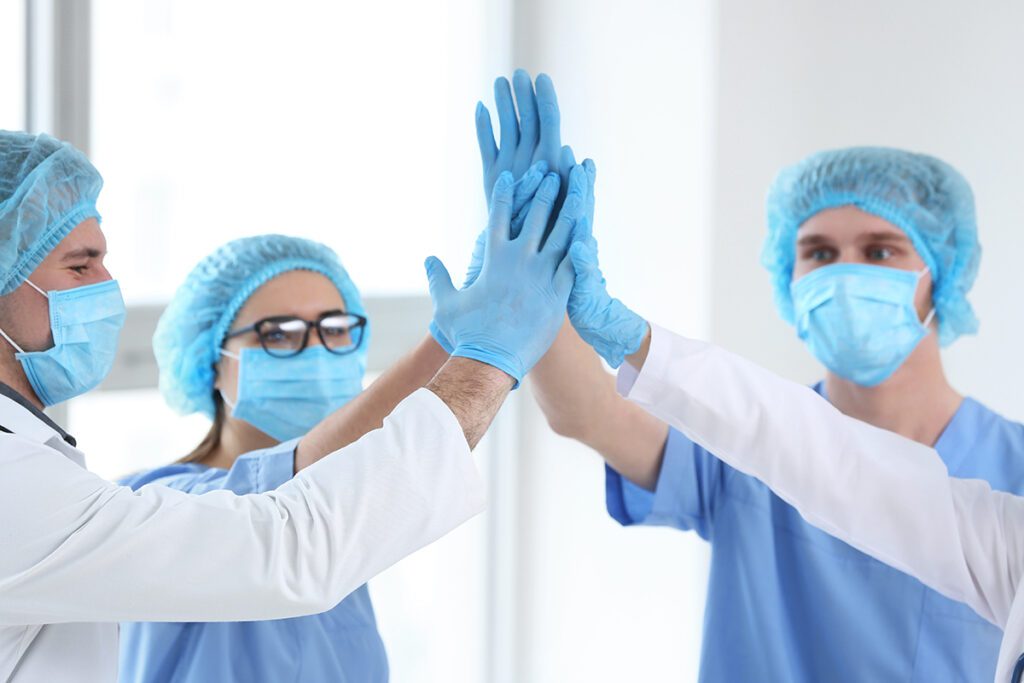Lakeland Regional Health Personnel Rise to the Challenge
by PAUL CATALA
Since the first case of coronavirus was detected in Florida, Anita Henry, supply director at Lakeland Regional Health Medical Center (LRH), has been working around the clock to purchase personal protective equipment.
LRH Population Health Coordinator Paul Needham has been working closely with skilled nursing facilities across the Lakeland area to monitor outbreaks since those facilities have been hotspots for COVID-19 in Polk County.
And Marjan Conklin, an LRH emergency department nurse, has been spending her work shifts maintaining patient care and motivating staff during this tumultuous time in healthcare.
As those in the healthcare industry continue to battle against a virus that has affected populations around the world, these three LRH staff members are joining LRH hospital staff and countless others in healthcare professions around the world putting in countless hours to treat, curtail, and contain the virus.
Henry, in her 22nd year in hospital work and fifth at LRH, says that since the end of March and through April, the influx of patients symptomatic of COVID-19 or with the virus has increased ER workloads significantly. However, she adds, she and her staff have been working to ensure that medical staff members have all the supplies that they need.
“By the week of May 4, thankfully, things have kind of leveled off and we’re returning to some more routine duties,” she says.
Henry says she and her staff are working to maintain schedules that won’t “exhaust” staff.
“We’re trying to make sure everybody has a good work-life balance during this stressful time,” she says.
Henry’s department makes sure all the tools and materials medical staff needs to fight the virus are at hand, including Personal Protective Equipment (PPE) such as facemasks, respirators, and eye protection. She adds one of the challenges she has encountered has been sourcing products from non-traditional sources because of allocation and product shortages and looking for trustworthy vendors.
“We’re just trying to make sure that our team has everything they need to take care of patients,” she says.
The teams utilizing equipment and gear provide by Henry and her department partly consists of hospital staff like Conklin, who is in her 11th year at LRH as a registered nurse and clinical service coordinator.
Since the first coronavirus cases began rolling in at LRH, Conklin says she is beginning to see a moderate decrease. She says she has seen an amazing spirit of cooperation in the emergency room within team pods.
“It’s very important for my team and I to have a good perspective on our day-to-day focus at work; it’s very important for us to have a positive energy and a teamwork effort – we’ll get through this together,” she says. “Honestly, I cannot get through my day without my team, everyone involved.”
Conklin says LRH has been exceptional in providing staff with proper PPE and the process of getting that protection has been very organized.
Outside of LRH, one of Conklin’s concerns is people holding off seeking medical attention due to insecurities. But if people don’t have symptoms, she says to “stay home.”
“It has definitely taken a toll (on staff), but I feel like with my team, once again, I can’t get through the day without them. It’s draining some days, but it’s all worth it,” says Conklin. “We’re making history and we’re part of it; we’re just glad to be there and to be able to help the community. In the ER, we are ready to take on any changes.”
That sentiment is also felt in Needham’s department. He says his team of nurses have had to take on some completely different work roles. Those include learning to understand the virus while finding with some of the patients, complying with directions like self-isolation are hard to do and hard to apply.
Needham, who is in his sixth year at LRH, says to solve some complicated problems related to the coronavirus, he and the nursing staff have had to come up with new solutions and new ways to fight the virus going forward.
“We have to get comfortable with saying, ‘We don’t have the answer, but let me go find it.’ We’re really dealing with new problems, and we have to say, ‘Let’s pause a minute and find an answer,” he says.
As for LRH coronavirus patients, Needham says they are carefully managed after discharge from the hospital and care is taken to make sure insurance requirements are met and the right follow-up providers are assigned. With high-risk, older patients, he gives credit to LRH nurses for their specialized attention to updates from the Centers for Disease Control and Prevention and testing recommendations.
“I would give full credit to the nurses. Really early on in this coronavirus epidemic, they realized…when patients come back with a positive result, they’re going to be anxious, they’re going to have questions about what they should do, and there’s no guidance for this. It’s changing every day,” Needham explains.
Overall, these three LRH members on the frontlines of the epidemic say they’re proud of their individual work efforts as part of larger logistics.
“I personally think it makes you appreciate everything you have, particularly those of us who have continued to work through this crisis. I have friends and family without jobs and I appreciate we’re still employed,” Henry says. “It has made a big difference in realizing our value in the hospital and our value to the community.”
